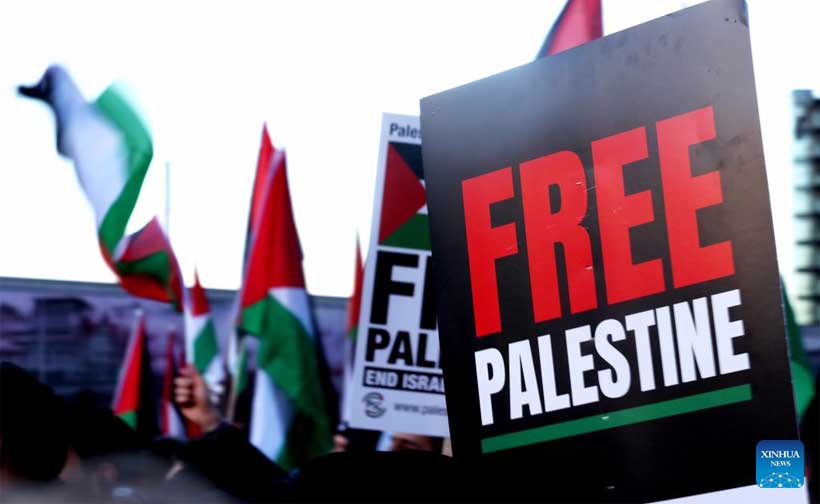The arrest of more than 700 people during Palestine Action demonstrations has rekindled the debate. These arguments revolve around how to balance state security and individual freedoms in the UK. Heavy policing, frequent raids and mass arrests have accompanied the protests that centre mainly on the UK based firms importing weapons related to the arms trade in Israel. It has been portrayed by the government that these are done as a part of law and order, but critics claim that such a magnitude of arrests against mostly peaceful protestors is alarming as it moves the state towards authoritarian policing. Civil liberties may be gutted when protest action is coded by the state through a mass punishment process that renders citizens freer to disagree with government policies or with corporate participation in controversial wars overseas.
The main problem with such developments is that there is an eroded distinction between policing and political repression. The actions of protesting arm companies with ties to Israel might be considered disruptive, however they are really acts of political speech which is a pillar of the democratic society. It is this aggressiveness in pursuing protesters that the state risks criminalizing activism. This is a bad precedent, peaceful opposition will be identified with crime, and any rightful protest will be discredited in the name of order. This attitude that the political leanings of a person can dictate the response of the police negatively affects the belief of the people in the police system as well as in encouraging people to practice democracy freely.
It is also a step in the wrong direction to make it public that these arrested suspects are of a particular race and their immigration status. Superficially it can be explained by the need to be transparent. Nevertheless, in practice it might stigmatize minority communities and present the picture protest as an imported issue by immigrants instead of a domestic political problem. These actions may strengthen the racist discourses as migrants or racial minorities appear to participate in the rebellion or crimes in huge proportions. When anti-immigrant rhetoric is already present in segments of political speech, racial and migration issues interact in the form of intensifying scapegoating of vulnerable groups and the continuing division of society. It is unsafe to make these sensitive factors of the anti-immigrant rhetoric and anti-immigration activism components of the public record in protest related cases.
The government has justified its move as a logical trade off: we must compromise our freedoms so that we can enjoy national security and safety. But history teaches us repeatedly that once you have unleashed restrictions of freedoms in the name of security, it seldom returns. The historic legacy of civil liberties in the UK in the form of the right to protest, freedom of speech and the right to assembly has already been undermined over the last few years by legislation like the Police, Crime Sentencing and Courts Act.
Such actions have empowered the police to repress demonstrations and thwart the fundamental meaning of democracy interaction. The recent suppression of Palestine Action is further evidence of this, only exacerbating the trend due to the simplicity with which governments justify making use of security to cover its authoritarianism.
Brute force policing of activists would even backfire as well. Likewise, surveillance, a sense of being silenced and wrong criminalization, are other factors that contribute to alienation among people. Such policies are likely to have the opposite effect to what they intend because they radicalize even more people into believing that peaceful means of protest are exhausted. These communities are already marginalized be it political, racial or immigration background and thus they are highly susceptible to such alienation. This strategy of the state fails to achieve its intended purpose of ensuring that society remains safe, opening even wider rifts in society and creating feelings of vengeance toward the institutions whose purpose is to cater to the needs of every citizen.
The UK will have to change its tune on protest and political dissent should it wish to continue adhering to its democratic ideals. Policing must be equally reasonable and unbiased, not a club of political expediency. Mass arrests and stigmatizing disclosures of race or immigration status are undone by dialogue and accountability instead of the involvement of activists by the authorities. An effective democracy needs to welcome disruptive protest when it reveals unpleasant facts about foreign policy or corporate cooperation in war. Silencing such activism can temporarily cripple vocal opinions but it will also undermine democracy within society in the long term.
The argument that is generated by the crack down on Palestine Action is not a single protest movement. It goes to the very core of what type of a society the UK aspires to be. Will it increase its authoritative policing that defies liberty at the cost of security? Or will it hold fast to its democratic tradition by safeguarding dissent even when that is disruptive or makes things uncomfortable? Publication of race and immigration status of suspects is nothing but a distraction to these underlying questions because it shifts the blame to a certain community instead of looking at the root of the problem which is the right of the citizens to speak and act against their own government. Finally, there is a chance that a society founded on the concepts of security over liberty will end up losing it all. The issue of liberty versus fear has few more clear cut versions in the UK.
